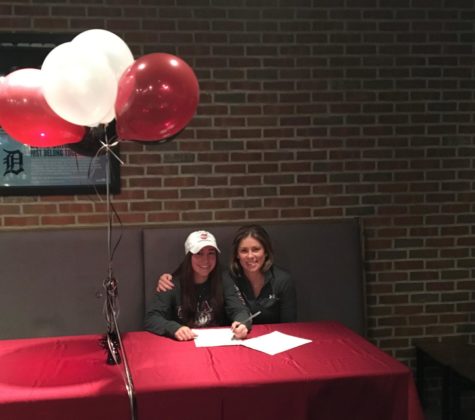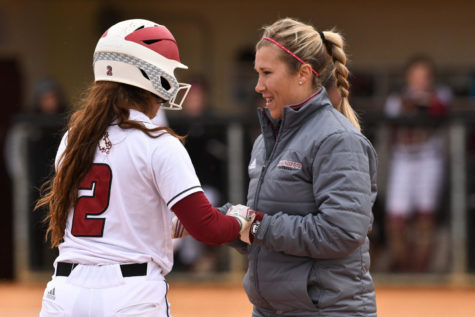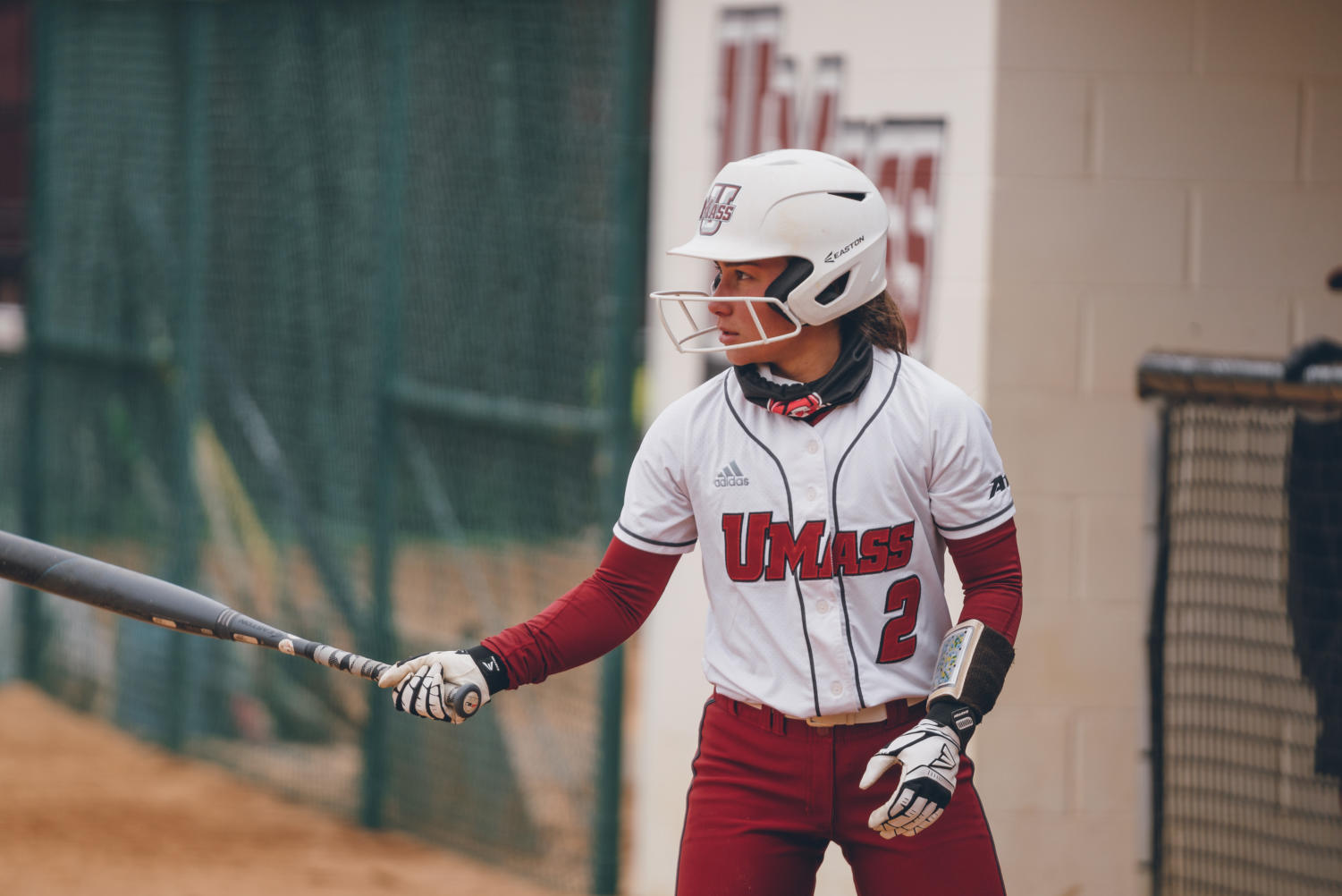The anatomy of a player: The formation of Hannah Bunker’s inner battles
Why Bunker’s mental fixations are representative of universal struggles
May 6, 2021
It was very dirty, broken, and was near the end of its life. The holes were more apparent than anything else but worn-down material still held significance. Hannah Bunker just couldn’t let go.
It was not so much a matter of physical attachment, but rather a mental fixation. With a sport like softball, one that requires mental toughness to an extreme, unusual habits will form. And for some, those habits will remain longer than others.
Bunker grew up in Waterford, Michigan, around 650 miles away from the University of Massachusetts, the campus she now calls home.

Courtesy of Hannah Bunker
At Walled Lake Northern High, Bunker’s impact was felt from the moment she stepped into the Lady Knights uniform. As a sophomore, she earned first team All-State honors, and continued to earn that achievement for the years to follow. Bunker was widely known as great player in the region which left many options to choose from when it was time to take her game to the collegiate level. Those around her were not surprised when she chose a school far from home.
“That’s just something she always wanted to do, go away and get that college experience,” said Kristen Woodard, Bunker’s high school and travel softball coach.
To describe Bunker, Woodard explained that whether it was doing her own laundry, getting papers in on time, meeting deadlines or arriving early to things, Bunker always seemed to have things under control. She is mature, independent and responsible. Never a follower, and always marching to the beat of her own drum.
From a young age, Bunker’s reserved persona was very clear. On the field, for what she lacked in vocal communication, she made up in confidence and hard work.
Enter Woodard, who eventually became a motherly figure in Bunker’s life.
When Bunker was 12, she played for a travel U-14 team that Woodard was an assistant coach for. The combination of a strict, very tough head coach and teammates that were two years older, slowly began to knock away at Bunker’s confidence.
“I could see the potential in her but saw that she was struggling, and not believing in herself,” Woodard said.
Woodard then became a voice in Bunker’s ear. She gave Bunker consistent “atta girls” while at bat, and off the field guidance or advice. Thus, a space for Bunker to find herself as a player, even on a difficult team was created.
At the time of Bunker’s forming relationship with her soon to be high school coach, Bunker’s inner battles and mental tics formed as well, slowly turning into a large part of the player she then became.
Underneath her glove, laid another batting glove, that somehow earned a permanent spot in Bunker’s mind. She was convinced that glove was good luck. And it didn’t stop there.
When game day morning arrived, the preparation began the same way every time, with socks on first, then continuing to work her way from the bottom up.
“It was probably just one game where I realized everything just clicked and it just kind of stuck with me,” Bunker said of her superstitions.
The power of pre-game superstitions came to fruition long before Bunker put on a UMass uniform, but nonetheless, still occur years later and even from hundreds of miles away from home.
On a mid-spring day, with the sun oozing off the metal bleachers of Sortino Field on the corner of the UMass campus, 5-foot Bunker arrives in a high ponytail with long strands of curls that fall down her neck. She has already put her socks on first like always, then the rest of her uniform to follow. And lastly the final thing to check off her list, Bunker continues a tradition that began with a former player and gives head coach Kristi Stefanoni a piece of gum before every game.
It was probably just one game where I realized everything just clicked and it just kind of stuck with me.
— Hannah Bunker
While the Minutewomen begin to engage in warm up routines, Bunker’s mentality is matched by someone else. Someone she may not expect, or even know at the time.
“I have a certain time and place when I go to Sortino field where I write my lineup,” Stefanoni said.
With laughter, Stefanoni explained that there are more secret superstitions that run through her mind on game day morning, and some that date back to pre-coaching days.
On May 26, 2006, the UMass softball team was gearing up for a game against No. 4 Northwestern in a best-of-three Super Regional Series. Among the roster of players in a maroon and white uniform that took the field in Evanston, Illinois that day was Stefanoni.
Stefanoni was a leader for the Minutewomen. A senior at the time, she was riding on the success of a conference win, regional win and potentially a super-regional series win.
And she had one main message throughout the successful post season run.
“Please don’t wash my socks.”
Stefanoni begged the equipment manager to not allow soap to strip away at any good luck or voodoo that was mixed into the textiles of her socks. Grass stains and dirt added color, the smell lingered, and the dampness probably did too, but it didn’t matter. They were staying that way.
The lingering hope that remained in just a piece of her equipment was representative of a lot more. And while Stefanoni’s superstitions as a player and now coach can help better understand the choices of some of her players, the lessons learned from her time on the field go beyond a sweaty sock or lucky glove.
The Stefanoni philosophy is created with experience of what being a student athlete really means. Having done the exams on bus rides to games or navigating through finals and playoffs simultaneously or even just compartmentalizing sports and college, she has done it all.
So as Stefanoni reflects, looking at the field she once played on, or hearing the chants echo through a bus she may have ridden, she is reminded of what is most important to a successful team.
“Their mental health means a lot to me…they are not just an athlete to me; they are human beings,” Stefanoni said.
But Bunker made it very clear that she doesn’t always give Stefanoni the easiest brush to paint with.
“I’m not always the best at expressing how I feel, on and off the field,” Bunker said. “Putting on a good face at practice is probably a lot easier than expressing your emotions and I think that is something I have always struggled with.”
Stefanoni, a coach and person who wears her heart on her sleeve, had to learn to make her player comfortable.
So Bunker opened up to Stefanoni.

She told her that a beneficial method to their relationship and developing her leadership skills would come through reminders. Whether that was telling Bunker she needed to help a young player in a drill, or maybe just speak up more in that moment. It all came through communication that was unique to the coach and player relationship they formed over the last few years.
A true leader is one who doesn’t pretend to be someone they are not. Stefanoni saw that Bunker found a way to be exactly who she was, while still leading the Minutewomen.
And over time, the group of seniors who have been with Bunker since day one on campus learned to adapt to her needs too.
“They know how I tic,” Bunker said. “How I cope with things when I am not ok.”
Bunker’s reserved nature does not mean she is any less of a teammate, but rather one who is willing to work on her mental game, at the same time she looks to improve on the field.
Resources such as Dr. Nicole Gabana, the director of sports psychology at UMass and through open conversations with coaches reminded the Minutewomen that it is ok to not always be ok.
But for Bunker, it was also the reminder it is ok to not yet know how to say I am not ok. It was the reminder that some traditions may call for a change.
They know how I tic, how I cope with things when I am not ok.
— Hannah Bunker
Growing up very conscientious, with a “think through things” mentality, keeping to herself and remaining introverted, superstitions gave Bunker that extra boost of confidence that she needed.
UMass and Stefanoni gave her the space to navigate through them and learn that people will adapt to how you work.
“I always let them know that if they need to take a day, they can take a day,” Stefanoni said.
Not because she thinks that rest or a time off will put another win in her column, but because she’s been there, and she cares. Always asking her team and coaching staff what they need from her today.
“I think about my team every day,” Stefanoni said. “Probably every moment of every day.”
On April 6, 2021, Bunker crossed home plate with her curls hiding under her helmet and a smile on her face. Her socks were put on first that morning, and a piece of gum was given from her to Stefanoni. Cheers roared and echoed throughout campus for Bunker’s first collegiate home run, but something was missing.
The beat up, foul smelling, worn apart glove.
Bunker learned to let that glove go.
Lulu Kesin can be reached at [email protected]. Follow her on Twitter @Lulukesin.
